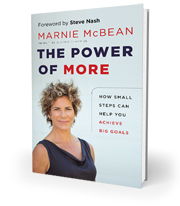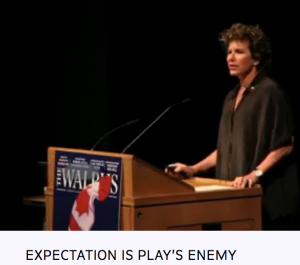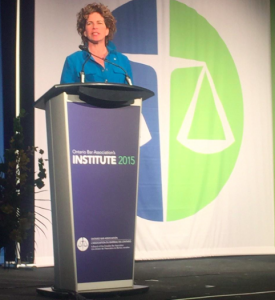 See the Spaces
See the Spaces
An excerpt from The Power of More, How Small Steps Help You Achieve Big Goals
… I was burnt out, exhausted both physically and emotionally. I needed a change, so at the age of twenty-eight I retired from sport. Or so I thought. The next year would help to remind me of some important and really doable goals that I had once set for myself.
In my retirement I unwrapped myself from my overprotective lifestyle and learned to snowboard in Whistler, B.C. I thought this would be a good time to go and play on a mountain instead of at a lake; I affectionately referred to this season as “the year of the broken bone.” Before retirement, my health had affected not only my performance but also that of my rowing partner. In this “arranged marriage,” Kathleen Heddle was my dependant, and I was hers. If I got sick or injured, I took Kathleen down with me; a port is no good without a star- board. This had made me particularly sensitive to the dangers of getting injured by doing something dumb. There would be little forgiveness if I showed up with a non-rowing injury. I had pretty much turned myself into a one-trick pony in bubble wrap. This was the first thing I wanted to change. I wanted to have fun, to be carefree, and I was prepared to accept the consequences. For the first time in a long while I felt as if I could take an unplanned risk. What joy!
Living in Whistler and learning to snowboard was fantastic, but I still craved structure and focus. At the suggestion of a friend, I took a course, got certified, and—with the help of Intrawest, the company that owned Whistler Blackcomb was quickly teaching adult beginner snowboarding. What a blast! I would free-ride in the morning with the other snowboard instructors, and then, from ten to noon each day, I’d teach a class. Saying that I snowboarded with the other instructors may be a bit of a stretch. The truth was that I had to do everything I could just to keep them in my sights. If this was a cup (of rice that) I was trying to fill, mine was still mostly empty.
Just as I hoped to progress and learn every day, I watched the other instructors improve their abilities too. They kept trying to get more height off a jump, to do a new trick, or to master a bigger feature. I watched how they would try every day but never put a timeline on their learning. They were definitely ambitious about snowboarding, but they were also patient. It made me realize that I had forgotten patience when I was rowing. I was also struck by how playful sport can be— there was so much joy.
The lifestyle I created as a snowboard instructor made a few other things apparent to me. Not the least was that I wasn’t cut out to be a great snowboarder! I missed Continue reading



 presentation for the Ontario Bar Association (OBA) I wasn’t convinced that talking about Starting Happy so that you can Finish Happy would entice a bunch of lawyers to come to the luncheon where I was to speak. This topic isn’t about trying to be all skip-happy with a giddy smile but upon introduction it might sound that way. It is a discussion about confidence in your preparation, dealing with hard conversations, anticipating change and challenge and knowing that you are the ‘someone’ that you’ve been waiting for. These four pillars create a “Start happy” foundation that is likely to lead to accomplishing your goals thus “Finishing Happy”. Still, I felt that idea of a discussion of being happy wouldn’t draw the lawyers in.
presentation for the Ontario Bar Association (OBA) I wasn’t convinced that talking about Starting Happy so that you can Finish Happy would entice a bunch of lawyers to come to the luncheon where I was to speak. This topic isn’t about trying to be all skip-happy with a giddy smile but upon introduction it might sound that way. It is a discussion about confidence in your preparation, dealing with hard conversations, anticipating change and challenge and knowing that you are the ‘someone’ that you’ve been waiting for. These four pillars create a “Start happy” foundation that is likely to lead to accomplishing your goals thus “Finishing Happy”. Still, I felt that idea of a discussion of being happy wouldn’t draw the lawyers in.